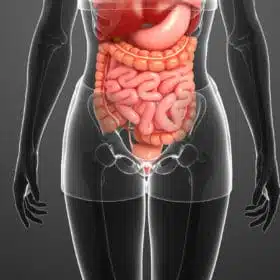A Bloated belly can be an extremely unpleasant thing. Often only a rumbling sensation is noticeable after eating. Shortly afterwards, the stomach tightens and begins to visibly bloat. This not only feels uncomfortable, but also looks like a spontaneous flash pregnancy from one moment to the next. We tell you how a bloated belly develops and what you can effectively do about it.
What causes a bloated belly?
The cause of bloating is gas in the intestines. These are formed during the digestion of our food. This is actually quite normal when food is broken down into its individual components with the help of enzymes and bacteria. Normally, the resulting digestive gases do not cause any major problems, as you either exhale them through your lungs or allow them to escape quietly via intestinal winds. With a classic bloated belly, however, the situation is somewhat different.
Such large amounts of gas are formed here that the gases cannot be optimally removed. This causes the abdomen to bloat, which can sometimes lead to abdominal pain. There are several possible causes. These include food allergies and intolerances, intestinal diseases, intestinal fungi or so-called irritable bowel syndrome, but also stress and too little exercise.
How to track down the cause of a bloated belly
To narrow down the cause, you should keep a food diary in which you record all the food you have eaten over a period of at least two weeks. At the same time, make a note of all symptoms and their intensity in your food diary. In this way, you can establish a direct link between certain foods and bloating. As soon as you have discovered a suspicious food, leave it out as a test.
For example, if the foods in question are primarily dairy products, it is likely that your bloated belly is caused by lactose intolerance. The longer you keep your diary, the more precise the database will be. Apart from food, you should also scrutinize your lifestyle habits. Do you exercise too little? Do you have too much stress? If in doubt, change this. If the symptoms still don't improve, it's time to see a doctor.
Some foods can promote a bloated stomach
Even apart from food intolerances, some foods can promote a bloated stomach, as they release an above-average amount of digestive gases during digestion or have a bloating effect themselves. These include, among others.
- Carbonated drinks (especially fine-sparkling drinks such as sparkling wine)
- Pulses
- Cabbage
- Onions
- Nuts
- Raisins
- Fruit (unripe)
- Fried food
- Fast Food
- Hot spices
- Coffee
- Chocolate
- Breaded meat
Get a grip on your bloated belly with these 7 tips
As long as no physical cause such as an allergy or illness is the cause of your bloated belly, small everyday tips are usually enough to get rid of it.
1. treat your bloated belly with heat
For many people, stress is the main trigger for a bloated belly. This can be explained quite simply: The stress hormones released cause the sympathetic nervous system to be activated. This prepares the body for activity - the classic "flight or fight" activity. As a result, your breathing rate and pulse rate increase alongside your alertness and ability to concentrate.
In return, the body reduces digestive activity to a minimum. After all, there is no time for digestion in a "flight or fight" situation. Unfortunately, your body doesn't know that it's not a matter of life and death, but just everyday stress. So the result remains the same. You can relax the situation with the help of warmth. Simply place a hot water bottle on your stomach. This relaxes the smooth intestinal muscles.
2. chew your food thoroughly
Do you remember your grandma always telling you not to gorge, but always to chew well? As is often the case, grandmothers are usually right. If you swallow pieces that are too big, you make it unnecessarily difficult for your gastrointestinal tract to digest the food. So chew every bite thoroughly. Your stomach will cope much better with this. It's also better to eat smaller portions several times a day than to eat large portions twice a day.
3. make sure you consume enough fiber
Fiber is an enormous help for your intestines during digestion. Among other things, it provides food for the beneficial bacteria without which effective digestion is not possible. In addition, some fibers also swell up in the intestines and thus stimulate digestion. According to nutrition experts, around 30 grams of fiber per day is ideal. Fiber is mainly found in wholegrain products and numerous legumes and vegetables. Caution: If you are not already consuming enough fiber, your intestines must first get used to it. So increase the amount slowly.
4. use probiotics
Without certain bacterial strains, digestion would hardly be possible. You can rely on probiotic foods to support or generally supply these bacteria. These contain bifido and lactic acid bacteria, which regulate the pH value of the large intestine, among other things. Quark, sauerkraut or kefir, for example, are ideal. Alternatively, you can also rely on foods with artificially added probiotic cultures to build up effective protection for the natural intestinal flora.
5. move more in everyday life
Did you know that too little exercise is probably the most common cause of a bloated belly that is not due to physical causes? Frequent sitting makes it difficult for gas to escape from the intestines and neither the intestinal muscles nor the smooth intestinal muscles are stimulated to move more (peristalsis) by external stimuli.
Take the stairs instead of the elevator more often in everyday life. Ride your bike to work. Get up from your desk more often. Take a walk or do a few squats during your lunch break and you will improve the situation considerably. Classic sport is of course also part of your exercise program.
6. keep your abdominal muscles fit
While we're on the subject of sport: Well-trained abdominal muscles also have an influence on digestion. Regular abdominal muscle training means that the deeper abdominal muscles no longer tense up so quickly. And by the way, you also strengthen your core, which is also beneficial for a healthy posture and prevents back pain.
7. drink a lot and regularly
Your intestines can only work optimally if they get enough water. If you drink too little, on the other hand, your intestines will become sluggish and will no longer be able to remove the chyme efficiently. You should drink at least two liters of liquid per day. However, the rule of thumb is ideal for sporty people: 1 liter of water per 20 kilograms of body weight. To avoid further irritating the intestines, you should cover the majority of your fluid requirements with tea and still water.
Tackle bloating with the right foods
You can also influence how your gut reacts through your diet. In addition to the "bloating tips" already mentioned, we would like to give you a few more foods that can alleviate bloating symptoms.
1. yogurt
Yoghurt is known to promote the natural balance of intestinal flora due to the probiotic bacteria it contains. Ideally, you should buy low-fat natural yogurt that contains neither added flavors nor added sugar. To get some fiber into your gut, you can mix the natural yogurt with a portion of wild berries.
2. cayenne pepper
The capsaicin contained in pepper and chili is responsible for the characteristic spiciness. But that's not all, because the substance also acts as a natural fat burner. Your bloated belly also benefits from well-seasoned food, as the substance also stimulates digestion and thus prevents excessive gas formation.
3. fennel seeds and fennel tea
Admittedly, fennel seeds are a rather unusual food. However, just like fennel tea, they have an anti-inflammatory and antispasmodic effect. They are therefore ideal for relaxing the intestinal muscles and allowing excess air to escape. If you don't like fennel tea, half a teaspoon of fennel seeds per day is completely sufficient.
4. garlic
Garlic not only gives your food a special flavor and supports your immune system, but can also break down digestive gases. However, for this to work optimally, you should eat garlic on its own, for example in the form of a delicious garlic soup.
5. lemons
Lemon is a true all-rounder. Not only does it act as a valuable source of vitamin C, it also helps the body to eliminate toxins. The citric acid it contains also stimulates the stomach to produce hydrochloric acid, which is essential for the digestion of food. A few glasses of lemon water a day can work wonders. For the best effect, you should drink the lemon water on an empty stomach some time before eating.
6. ginger
Ginger root is a real classic among home remedies. Its ingredients not only help to relieve pain and nausea, but also have anti-inflammatory and antibacterial properties. Ginger also contains the digestive enzyme zingibain, which helps with protein digestion. Whether you eat fresh ginger, drink ginger tea or use ginger shots is up to you. You can find out how to make the latter in our article "Ginger - The power tuber offers you these 6 unbeatable benefits".




